
Stevland Hardaway Morris, known professionally as Stevie Wonder, is an American singer-songwriter, musician, and record producer. He is credited as a pioneer and influence by musicians across a range of genres that include R&B, pop, soul, gospel, funk, and jazz. A virtual one-man band, Wonder's use of synthesizers and other electronic musical instruments during the 1970s reshaped the conventions of contemporary R&B. He also helped drive such genres into the album era, crafting his LPs as cohesive and consistent, in addition to socially conscious statements with complex compositions. Blind since shortly after his birth, Wonder was a child prodigy who signed with Motown's Tamla label at the age of 11, where he was given the professional name Little Stevie Wonder.
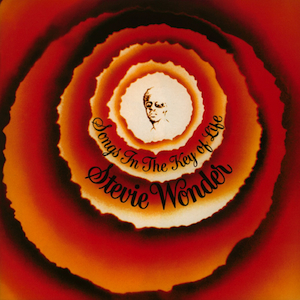
Songs in the Key of Life is the eighteenth studio album by American singer, songwriter and musician Stevie Wonder. A double album, it was released on September 28, 1976, by Tamla Records, a division of Motown. It was recorded primarily at Crystal Sound studio in Hollywood, with some sessions recorded at the Record Plant in Hollywood, the Record Plant in Sausalito, and The Hit Factory in New York City; final mixing was conducted at Crystal Sound. The album has been regarded by music journalists as the culmination of Wonder's "classic period" of recording.

Blow by Blow is Jeff Beck's second album credited to him as a solo artist. It was recorded in October 1974 and released via Epic Records in 1975. An instrumental album, it peaked at No. 4 on the American Billboard 200 and was certified platinum by the RIAA.
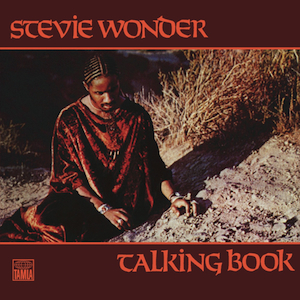
Talking Book is the fifteenth studio album by American singer, songwriter, and musician Stevie Wonder, released on October 27, 1972, by Tamla, a subsidiary of Motown Records. This album and Music of My Mind, released earlier the same year, are generally considered to mark the start of Wonder's "classic period". The sound of the album is sharply defined by Wonder's use of keyboards and synthesizers.
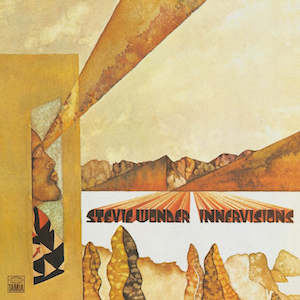
Innervisions is the sixteenth studio album by American singer, songwriter, and musician Stevie Wonder, released on August 3, 1973, by Tamla, a subsidiary of Motown Records. A landmark recording of Wonder's "classic period", the album has been regarded as completing his transition from the "Little Stevie Wonder" known for romantic ballads into a more musically mature, conscious, and grown-up artist. On the album, Wonder continued to experiment with the revolutionary T.O.N.T.O. synthesizer system developed by Malcolm Cecil and Robert Margouleff, and Innervisions became hugely influential on the future sound of commercial soul and black music.

Hotter than July is the nineteenth studio album by American singer, songwriter, and musician Stevie Wonder, released on September 29, 1980, by Tamla, a subsidiary of Motown Records. Wonder primarily recorded the album in Los Angeles at Wonderland Studios, which he had recently acquired. The album peaked at number three on the Billboard Top LPs & Tapes chart and was certified Platinum by the Recording Industry Association of America (RIAA) on February 3, 1981. It was Wonder's most successful album in the UK, where it peaked at number two on the UK Albums Chart and produced four top ten singles. Music videos were produced for the album's first, third, and fourth singles.
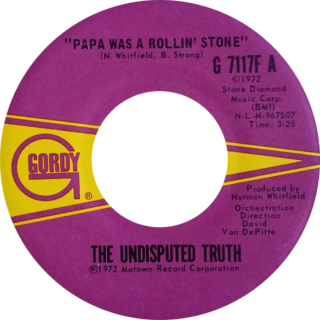
"Papa Was a Rollin' Stone" is a song originally performed by Motown recording act the Undisputed Truth in 1972, though it became much better known after a Grammy-award winning cover by the Temptations was issued later the same year. This latter version of the song became a number-one hit on the Billboard Hot 100.

Music of My Mind is the fourteenth studio album by American soul musician Stevie Wonder. It was released on March 3, 1972, by Tamla Records, and was Wonder's first to be recorded under a new contract with Motown that allowed him full artistic control over his music. For the album, Wonder recruited electronic music pioneers Malcolm Cecil and Robert Margouleff as associate producers, employing their custom TONTO synthesizer on several tracks. The album hit No. # 21 in the Billboard LP charts, and critics found it representative of Wonder's artistic growth, and it is generally considered by modern critics to be the first album of Wonder's “classic period”.
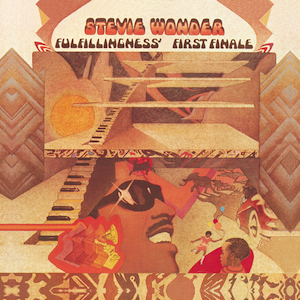
Fulfillingness' First Finale is the seventeenth studio album by American singer-songwriter Stevie Wonder, released on July 22, 1974 by Tamla, a subsidiary of Motown Records. It is the fourth of five albums from what is considered Wonder's "classic period".

Where I'm Coming From is the 13th studio album by Stevie Wonder. The album was released by Motown Records on April 9, 1971 and peaked on the Billboard Pop Albums at #62, and on the Billboard R&B Albums Chart at #7. All nine songs were written by Wonder and Motown singer-songwriter Syreeta Wright, his first wife. It was the last album produced under his first contract with Motown Records. Including live albums, this is Stevie Wonder's fifteenth album overall, and thirteenth studio album.

"Higher Ground" is a song written by Stevie Wonder which first appeared on his 1973 album Innervisions. The song reached number 4 on the Billboard Hot 100 and number 1 on the US Hot R&B Singles chart. Wonder wrote and recorded the song in a three-hour burst of creativity in May 1973. The album version of the song contains an extra verse and runs 30 seconds longer than the single version. The unique wah-wah clavinet sound in the song was achieved with a Mu-Tron III envelope filter pedal. The bass line is provided by a Moog synthesizer and using overdubs, Wonder played all instruments on the track, including drums and percussion.

"Signed, Sealed, Delivered " is a soul song, by American musician Stevie Wonder, released in June 1970 as a single on Motown's Tamla label. It spent six weeks at number one on the U.S. R&B chart and peaked at number three on the U.S. Pop chart. In the same year, the song was also released on the album Signed, Sealed & Delivered.
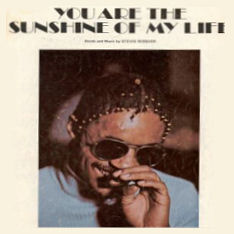
"You Are the Sunshine of My Life" is a 1973 single released by Stevie Wonder. The song became Wonder's third number-one single on the Billboard Hot 100 chart and his first number-one on the Easy Listening chart. It won Wonder a Grammy Award for Best Male Pop Vocal Performance, and was nominated for both Record of the Year and Song of the Year. This song was the second single released from the 1972 album entitled Talking Book, which stayed at number one on the R&B albums chart for three weeks.

"You Haven't Done Nothin" is a 1974 funk single by Stevie Wonder, taken from his album Fulfillingness' First Finale and featuring background vocals by the Jackson 5. The politically aware song became Wonder's fourth Number 1 pop hit and his tenth Number 1 soul hit. It also reached Number 1 in Canada. In the UK the single spent five weeks on the chart, peaking at Number 30.

Characters is the twenty-first studio album by American singer-songwriter Stevie Wonder, released in late 1987. The album features six singles including the Grammy-nominated "Skeletons" (#19) and "You Will Know" (#77), which both reached number one on the Billboard R&B Singles chart. The album also contained a duet with Michael Jackson, "Get It" (#80), that was a minor hit.

"Do I Do" is a song written and performed by American singer and songwriter Stevie Wonder, first released in 1982 on the compilation album, Stevie Wonder's Original Musiquarium I (1982). The single peaked at #2 on the US Billboard soul chart and #13 on the Billboard Hot 100. On the Billboard dance chart, "Do I Do" went to number one for two weeks. Overseas, it reached #10 in the UK.
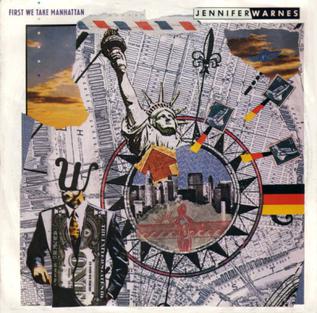
"First We Take Manhattan" is a song written by Canadian singer-songwriter Leonard Cohen. It was originally recorded by American singer Jennifer Warnes on her 1986 Cohen tribute album Famous Blue Raincoat, which consisted entirely of songs written or co-written by Cohen.

"Another Star" is a song written and performed by Stevie Wonder from his 1976 album Songs in the Key of Life. It is the final track on side four of the double LP. The flute player Bobbi Humphrey appears in the last section of the song.
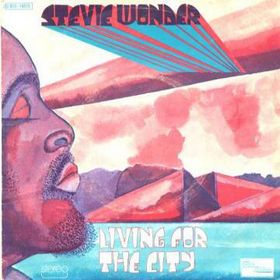
"Living for the City" is a 1973 single by Stevie Wonder from his Innervisions album. It reached number 8 on the Billboard Hot 100 chart and number 1 on the R&B chart. Rolling Stone ranked the song number 104 on their 2004 list of the "500 Greatest Songs of All Time".

Yvonne Lowrene Wright was an American songwriter and vocalist best known for co-writing with Stevie Wonder in the 1970s. Their songs appear on the albums Music of My Mind, Talking Book, Fulfillingness' First Finale, and Stevie Wonder's Journey Through "The Secret Life of Plants".




















